Published on May 28, 2024
The IAF is proud to introduce the 2024 IAF Emerging Space Leaders!
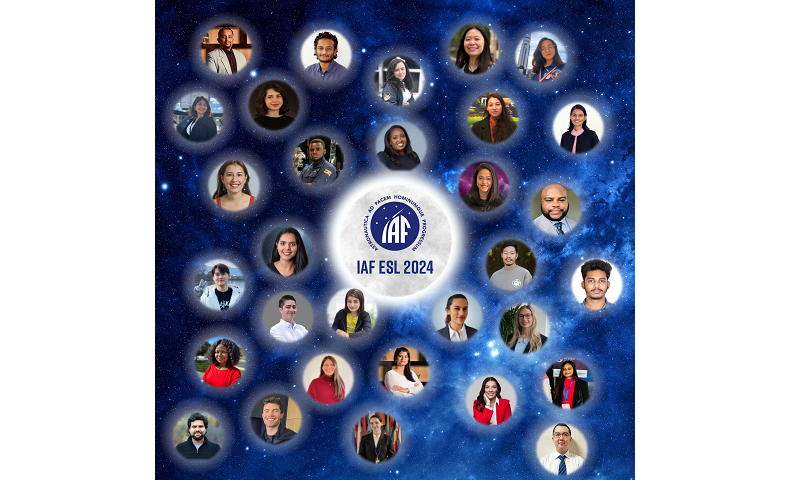
These students and young professionals were chosen by the IAF Emerging Space Leaders Sub-Committee composed of highly experienced space stakeholders. They will travel to Milan, Italy in October 2024 to participate in the 75th International Astronautical Congress and have the opportunity to extend their network, gain knowledge and meet space experts!
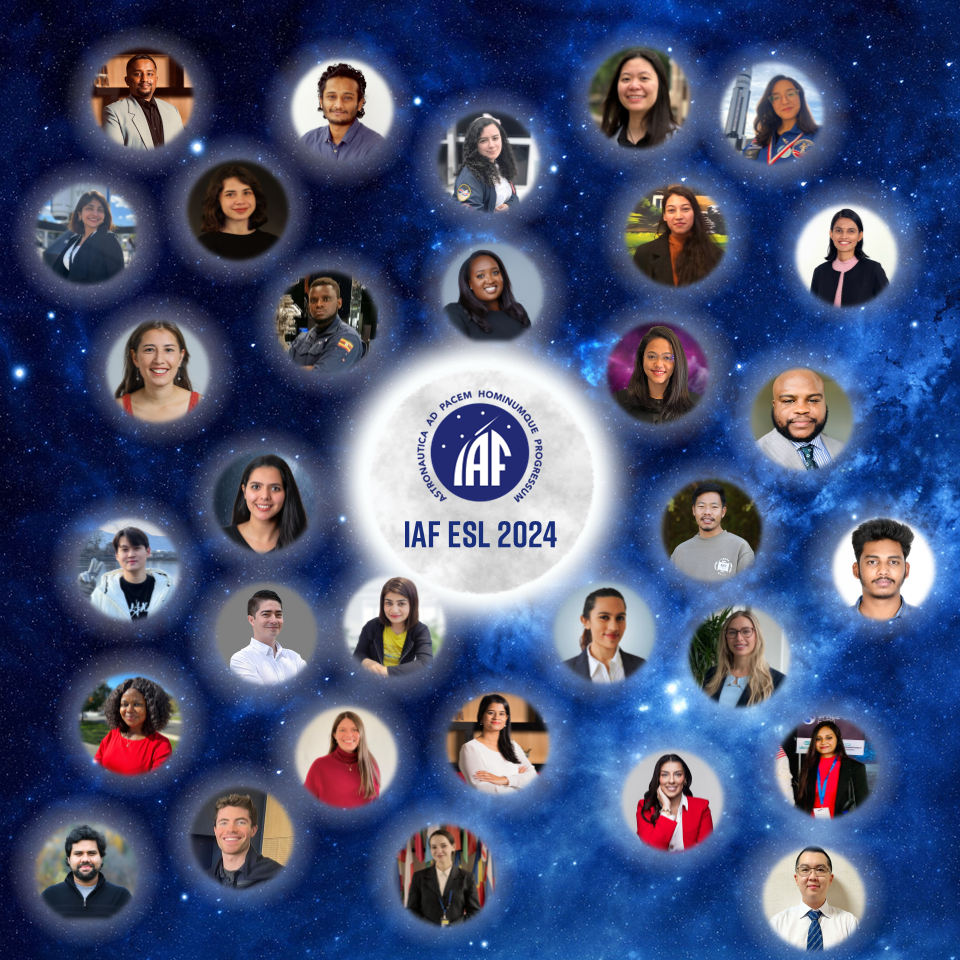
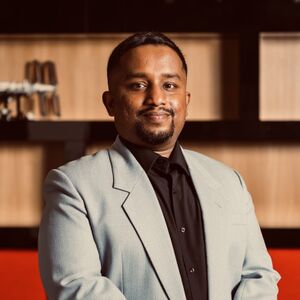
Anupam KUMAR PILLI
Anupam is at the forefront of shaping Australia's space industry through his role as Business Development Manager at the Australian National University’s Institute for Space. His work, including the development of the National Space Qualification Network (NSQN), is crucial in translating academic/industrial research into practical, scalable, and sustainable solutions that elevate Australia’s contributions to the global space ecosystem. Anupam's efforts are crucial in fostering international collaborations that enhance global space capabilities, demonstrating the profound understanding of the strategic partnerships between nations in the push to explore the final frontier – Space.
Beyond his technical and managerial capabilities, Anupam's entrepreneurial spirit shines through his venture, Straight Outa Vizag, a result of his passion for the arts. This endeavour reflects his belief that innovation is as much about technology as it is about human connections. This initiative not only fostered local agriculture but also served as a testament to his commitment to community engagement and environmental sustainability, promoting a holistic approach to innovation.
Anupam's perspectives on space revolve around the power of international cooperation to tackle some of the most pressing challenges facing humanity. He believes that fostering partnerships across borders can accelerate technological advancements and lead to sustainable outcomes that benefit not just individual nations but also the global community. His leadership is characterized by a drive to not only push technological boundaries but also to ensure that these advancements are leveraged for the greater good and for enhancing the life on Earth.
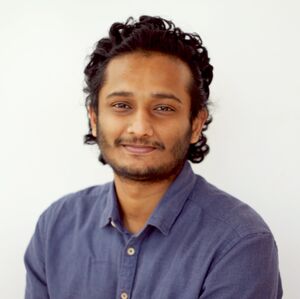
Balagopal MANAYIL SANTHOSH
Balagopal is a 2nd year doctoral student in the department of Mechanical and Aerospace Engineering at the University of Strathclyde, Glasgow, pursuing research in Particle Accumulation Structures in Multiphase flows under microgravity conditions. He is a member of the UK Space Agency sponsored T-PAOLA Particle Vibration Experiment, which was executed on board the International Space Station over a period of 3 months in 2023 to study how vibrating a differentially heated fluid, hosting a dilute random distribution of particles, can lead to complex particle-self-assembly phenomena in the absence of gravity. The successful experiment gathered a huge amount of data that are currently being post-processed to study this phenomenon further. Balagopal has a great passion for this research topic given its connections with important fields such as protein crystallisation, the production of alloys with completely new properties and in-space manufacturing of various other materials. His most recent publications detail how this aggregation phenomenon can be controlled by varying the thermal boundary conditions along with different modes of vibrations.
He was also a delegate representing the University at the COP26-COY17, 2022 (The Youth Constituency of the United Nations Framework Convention on Climate Change (UNFCCC)) sharing his insights on sustainable air mobility in the context of the UN Sustainable Development Goals.
His other research outcomes, related to Satellite Data Analysis, Spaceflight Mechanics and Constraint Layer Damping methods for Aero-elastic Flutter mitigation on Turbofan blades, were the result of collaborative efforts with other research groups.
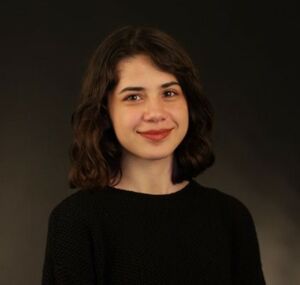
Beste BOYBASI
Beste is currently pursuing a bachelor’ s degree as a senior mechanical engineering and physics double major student at Koç University in Istanbul, Türkiye. Her academic career shows that she has been driven by a vision to merge science with engineering in the space industry. Her journey toward STEM education began with a childhood fascination for space sciences, which has directed her toward her current path. Currently, she is shaping her career around the space industry to inspire the younger generation with her roadmap for the future. Working in a developing country, she strategically utilizes available resources in her country and resources in other countries as well. Furthermore , she actively seeks diverse perspectives through internships in various companies both in Turkey and Europe. In her role as the mechanical captain of the Koç University Rocket Team, Beste manages a team to design and build rockets. This demonstrates her passion for directing the younger generation to the space sector. Moreover, her position as an undergraduate researcher at TÜBİTAK Space Research Institute further shows her commitment to shaping the future of space exploration by contributing to the design of future national lunar missions for Türkiye. Her diverse experiences, coupled with her passion for space sciences show Beste's willingness and ingenuity to contribute to the future of the space sciences.
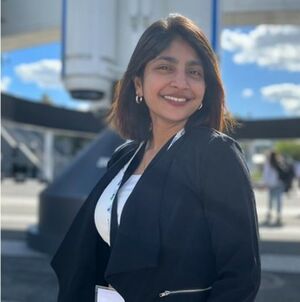
Brelveenraj KAUR
Brelveen is currently a Senior Satellite Engineer at MEASAT Satellite Systems Sdn Bhd. She has 5 years of experience in satellite control, engineering, satellite communications, and space system operation and maintenance. She holds a Bachelor Degree of Electrical and Electronics Engineering (Communications) from National Defense University of Malaysia and pursued her MSc in Aerospace Engineering with Universiti Sains Malaysia (USM). In 2024, she received the Asia Pacific Space Leader Award Leader (AP-SLA). As a recipient, she was granted the opportunity to participate in the 10th Asia Pacific -Space Generation Workshop held in Maldives.
Having a passion for space and satellites, she presented her research at the International Astronautical Congress (IAC) in Baku, Azerbaijan and International Conference on Space Science and Communication (IconSpace). Her first paper on Ground Based Augmentation Systems was published in the Springer – Proceedings of the 8th International Conference on Space Science and Communication.
As Malaysia's National Point of Contact (NPoC) for the Space Generation Advisory Council since Brelveen showcased leadership, leading the SGAC Malaysia team at the Langkawi International Maritime and Aerospace event (LIMA) in 2023, gaining recognition from the Malaysian Space Agency (MYSA). She advocates for SGAC members, securing their inclusion in governmental policy-making.
Aiming to bridge the gap between academia and space industry, she co-led SpiSEA, Southeast Asia's first and longest-running webinar, connecting students with industry leaders for internships and future career opportunities. Brelveen's commitment to space exploration and technology drives her to continue pushing boundaries, as she works towards her dream of being an astronaut.
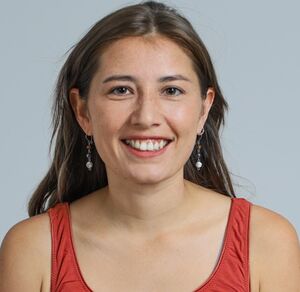
Casey Marie DOMINGO
Like many, space was my first true love. Watching the night sky endlessly, in admiration of its awe-inspiring domain. This fascination drove me to earn a Bachelor of Science in astrophysics. However, it was my passion for storytelling and commitment to equity that propelled me into STEAM communication, and now, cultural connections and ethics of space.
Over the years, I have facilitated countless youth science outreach programs and produced a variety of fundraising and community-led events. In 2023, I participated in the Southern Hemisphere Space Studies Program on a scholarship awarded by the Andy Thomas Space Foundation, then later returned as a teaching associate for the Brazil Space Studies Program. Recently, I was honoured to be the Laby Research Scholarship recipient to conduct cultural astronomy research at The University of Melbourne. Additionally, I co-created (Un)Common Cosmos, a new project devoted to amplifying and exploring non-dominant insights on outer space.
I firmly believe that the communication of space and astronomy holds the power to inspire humans of all ages, fostering both a deeper connection to the night sky and STEAM engagement. An engagement, that when conducted in a meaningful way, can have a myriad of positive impacts on and off Earth. However, as the new space era rapidly evolves, it becomes increasingly vital to critically examine our practices and relationships with outer space. In doing so, networks and praxis of international cooperation can greatly benefit by listening to, learning from, and actively including the perspectives of those typically marginalised.
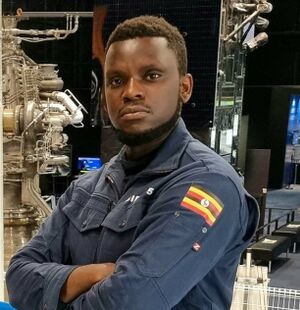
Edgar MUJUNI
Edgar Mujuni is a Special Presidential Assistant on Space Engineering for Uganda. He is renowned for developing Uganda’s first satellite, the PearlAfricaSat-1, which was successfully launched as part of the BIRDS-5 project in December 2022.
He holds a first-class degree in Telecommunications Engineering from Kyambogo University in Uganda. He too holds a Master’s degree in Space Systems Engineering from Kyushu Institute of Technology (Kyutech) in Japan. Currently, he is pursuing his Ph.D. studies in Electrical and Space Systems Engineering at the same Institute, where he belongs to the Wireless Systems Laboratory. This pursuit is under the Post Graduate Study on Nanosatellite Technologies Scholarship, funded by the United Nations Office for Outer Space Affairs (UNOOSA) in collaboration with the Japanese Government.
Mujuni has demonstrated expertise in various satellite subsystems, including Satellite Communications, Store & Forward Missions, Ground Sensor Terminals, and Ground Station operations. He is currently involved in projects such as LEOPARD and Micro-Orbiter-1 satellite development and operations at Kyutech. He is Uganda’s Point of Contact for UNISEC-global, an initiative aimed at fostering local chapters to promote practical space development activities primarily at the university level. He envisions leveraging satellite technology to address global challenges in agriculture, food security, disaster management, water resources, mineral exploration, climate studies, and scientific discovery. He believes that international cooperation is key to harnessing space-based solutions for these critical global issues.
In recognition of his significant contributions to the advancement of space technology within Uganda, Edgar was awarded the ‘Diamond Jubilee Medal’ by the Government of Uganda in 2023.
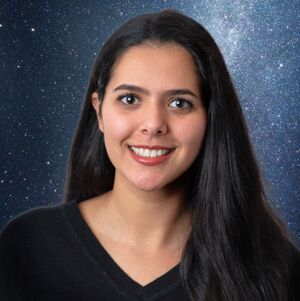
Fay ABDUL GHANI
Fay is a New Zealander, originally from Iraq, and currently a medical researcher working with the Center for Regenerative Biotherapeutics, Mayo Clinic, Florida, USA in collaboration with NASA. With a strong focus on advancing human health, her research focuses on studying stem cells in space and developing regenerative medicine therapies in microgravity for patients on Earth and future space travelers. Recognizing the importance of international collaboration in both space and medicine, Fay is involved in various organizations and meetings locally and internationally to discuss human spaceflight and the importance of developing medical research in space. She is passionate about increasing accessibility, creativity and transparency in the space sector and adopting interdisciplinary approaches to solving problems.
Fay received her Bachelor of Biomedical Science (Honours) degree with First Class Honours from the University of Auckland in New Zealand and was the recipient of two highly competitive research scholarships, awarded by the School of Medicine Foundation and Te Punaha Atea Space Institute. She has also been awarded scholarships and grants by the Auckland Bioengineering Institute, Northrop Grumman, Space Generation Advisory Council and Alberta Innovates.
Through her work, Fay continues to participate in expanding opportunities in space medicine research, especially for emerging space nations like New Zealand. She believes today's technological advancements in both medicine and space technology make it an exciting time to uncover human health among the cosmos and prepare for exploration of other planets while also benefiting human health on Earth.
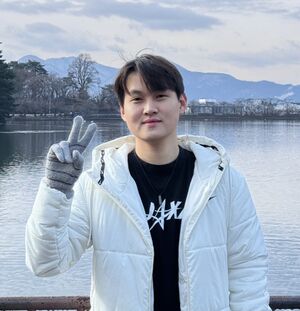
Hery Steven MINDARNO
Hery Steven Mindarno, currently pursuing a master’s degree in Space System Engineering at Kyushu Institute of Technology under the supervision Prof. Mengu Cho, is a recipient of the Japanese Government’s scholarship (MEXT) through the United Nations/Japan Long-term Fellowship Programme (PNST). He is a dynamic young space professional with expertise in satellite structure engineering and international collaboration. His contributions include being a key member in the development of Indonesia’s first nanosatellite “Surya Satellite-1”, which was successfully launched on 6 January 2023 as part of UNOOSA’s KiboCube Program.
Currently, Hery is actively engaged in the LEOPARD Satellite project as a satellite structure engineer. LEOPARD is a 3U CubeSat with multiple missions planned for Low Earth Orbit, set to be launched in early 2025. His contributions to the LEOPARD project demonstrate his continued dedication to advancing space technology and his ability to deliver robust and functional satellite systems.
In addition to his technical accomplishments, Hery’s professional development includes attending prestigious international space events such as the IAC and APRSAF. He has also gained valuable experience through internships at Tokyo startup and at BRIN's Satellite Technology Centre in Indonesia, where he honed his skills in satellite design and international collaboration. Additionally, his 3-year tenure in the IoT industry at Netra Space adds to his diverse expertise in space engineering and international collaboration. Hery believes that space exploration drives groundbreaking discoveries, global collaboration, and sustainability. He is committed to leveraging his expertise in space engineering to unlock space’s full potential for humanity's benefit.
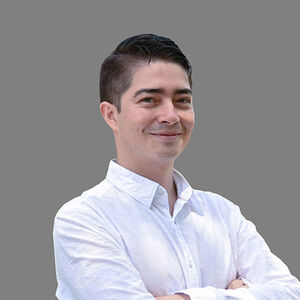
Jorge Rubén CASIR RICAÑO
Jorge Ruben Casir Ricaño is a Mexican Ph.D. candidate at the Space Robotics Laboratory of the Kyushu Institute of Technology (Kyutech). He is an awardee of the UN/Japan long-term fellowship “Postgraduate Studies on Nano Satellites (PNST).” Jorge's research focuses on developing self-diagnosis, prediction, and fault-detection systems for lunar rovers. He obtained a Specialist degree in the Design, Production, and Operation of Rockets and Space Systems at Bauman Moscow State Technical University (BMSTU).
Jorge is the project manager of Kyutech's BIRDS-X DRAGONFLY satellite, a team of more than 15 international students of different backgrounds. He is also the leader of the structure subsystem, where he designed, developed, and tested the satellite’s structure to comply with JAXA’s safety standards. Jorge contributed to the design, testing, and programming of two rovers for lunar construction collaboration. His research on anomaly and fault detection aims to improve the rovers' reliability and robustness, minimize resource wastage, and thereby enhance construction possibilities on the Moon and other planets. Jorge is also an active member of the space community, having been involved in organizing committees for several International Workshops, including the 1st MVA TWLG Workshop, where he was a discussion group moderator, and the 6th E-SGW. He has also participated in several regional Space Generation Workshops, two Fusion Forums, and a Space Symposium.
“Space is something so great, something so many people have dreamed of since they were kids, and I will do my best to make it not a dream but a reality for all.”
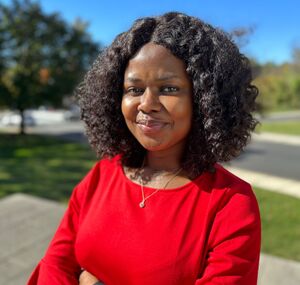
Lily R. ASONGFAC
Lily R. Asongfac is a dynamic telecommunications engineer renowned for her innovative problem-solving and strategic leadership. As Strategic Partnerships Manager at Space Hero Ltd, she achieved a remarkable 1500% increase in the partner portfolio by identifying underreached regions and executing tailored outreach campaigns. Her technical expertise was pivotal in designing a nanosatellite mission for the Gabonese Space Agency at NMD Ltd, showcasing her ability to navigate complex challenges for mission success.
Passionate about inspiring the next generation, Lily founded the Aerospace Baby Project, engaging children in space outreach activities to spark interest in aerospace careers. As the National Point of Contact for the Space Generation Advisory Council in Cameroon, she promotes STEM education and organizes events to involve youth in space activities, and she started the Youths for Sustainable Space Development (Y4SSD) community. Lily's mentorship extends to supporting university students, enabling them to participate in international space events and conferences.
Her achievements include receiving the Nebula Award and being selected as a TechWomen Fellow for the US Department of State. Additionally, Lily was honored with selection for the Space Foundation Teacher Liaison flight 24, further recognizing her exceptional talent and dedication to advancing aerospace. In summary, Lily Asongfac's leadership, innovation, and commitment to mentorship make her a driving force in the African space industry and a beacon of inspiration for the next generation of space professionals.
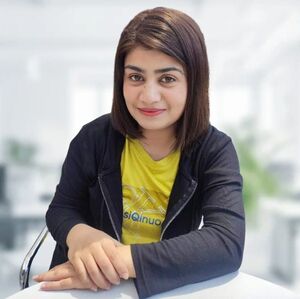
Madiha RASHEED
Dr. Madiha Rasheed is a Postdoctoral Fellow at the School of Medical Technology, Beijing Institute of Technology, China stands at the forefront of researching neurological impacts due to spaceflight. Her work is instrumental in understanding how prolonged exposure to space can affect astronaut health, focusing on pioneering RNA-based AIEgens to monitor neurobiological changes caused by microgravity.
Dr. Rasheed’s distinguished academic path, highlighted by a PhD in Biomedical Engineering, showcases her dedication to advancing space health. She has pioneered studies on miRNA- based-biomarkers for detecting space-induced depression and neurodegenerative conditions under spaceflight factors. As the first Pakistani to achieve significant breakthroughs in this domain, Dr. Rasheed has published numerous influential papers and significantly contributing to the global space biology research.
Her accolades include the Distinguished Student Award from Beijing Institute of Technology, reflecting her excellence and commitment. Dr. Rasheed has presented her innovative findings at international forums, strengthening global dialogue on space health, and fostering international collaboration.
A staunch advocate for integrating scientific research into space missions, Dr. Rasheed emphasizes the importance of international cooperation to enhance astronaut health and safety. Beyond her research, she is dedicated to inspiring future space scientists through active knowledge dissemination.
Through her pioneering research and unwavering commitment to education, Dr. Madiha Rasheed is shaping the future of space exploration, ensuring that humanity can safely navigate and explore the final frontier. Her work stands as a testament to the power of interdisciplinary collaboration and innovation, propelling our understanding of space and its profound effects on human physiology.
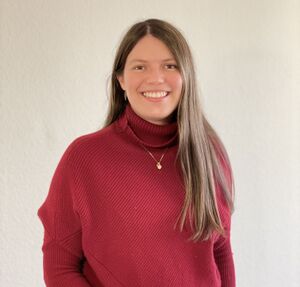
Maria Paula BUSTOS MORENO
Maria Paula (26) from Bogotá, Colombia, is a Geologist from the Universidad Nacional de Colombia. She dreams of becoming an astronaut and was an analog astronaut at the Mars Desert Research Station (Crew-226). She works in the operation of the Satellite Laser Ranging Station at GFZ, Potsdam, and is a student advisor at her university.
She received an Undergraduate Research Fellowship from Purdue University to research the agricultural impacts on soil in biogeochemistry labs. She is pursuing a MSc. in Geodesy and Geoinformation Science at TU Berlin, focusing on using satellite data to monitor Colombian water bodies, aiming to address the country's freshwater crisis. She is a student in the Space Entrepreneurship program at the European Institute of Innovation for Sustainability, developing a startup idea under the guidance of AIRBUS, ESA, and ThalesAlenia.
In 2021, she supported the recognition of the Colombian Paleontological Museum of Villa-de-Leyva as a science center and, under the guidance of the Ministry of Science, led the unification of several science centers in Colombia.
Colombia is one of the most biodiverse countries and richest in water resources. Maria Paula considers that international cooperation is essential to protect these resources by supporting Colombia in its efforts to integrate SAR technology into its satellite missions to address challenges such as water scarcity, wildfires, and deforestation.
Maria Paula volunteered teaching English to children affected by Colombia's armed conflict through the Match-Tenis-Foundation, volunteered as a cycling ride leader with VOXWomen, enjoys practicing triathlon, and communicates science through her initiative @DailySciencePosts.
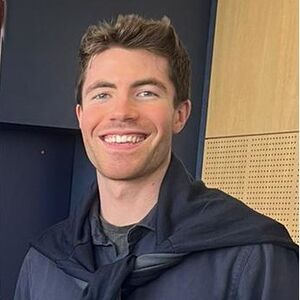
Matthew SUTCLIFFE
Matthew is a junior researcher in space policy and strategy. His masters thesis research argues for the development of cooperative strategies in space technology and policy, having previously worked for Cambridge Political Futures in their collaboration with Oxford’s smart space series. Matthew believes an important part of promoting cooperation and future space exploration missions will be advancing multilateral science and technology agreements. Those agreements should aim to provide sustainable space technologies and applications in support of the betterment of humanity and the planet. His longer term aspirations are to steer international space policy, and he believes effective diplomacy in the space field, whether governmental or corporate diplomacy, calls for strong liaison skills to coordinate such projects. Matthew looks forward to contributing toward such agreements in the Asia-Pacific region, including bilateral joint ventures between emerging spacepowers, APAC partners, as well as multilateral projects involving international organizations, national agencies and the commercial sector. His expertise in future technologies, exploration projects and over-the-horizon strategic plans are particularly favourable for this skillset. Matthew graduated from the University of Cambridge with a BA (Hons) in Politics and International Relations, and is soon to graduate from his Masters at the Paris School of International Affairs. He is passionate about astronomy and astrophysics, and is a member of La Société astronomique de France. He has an ECSL/ESA space law accreditation and was a student delegate to the Académie de l'air et de l'espace in 2023. In his spare time, Matthew enjoys playing sports and the piano.
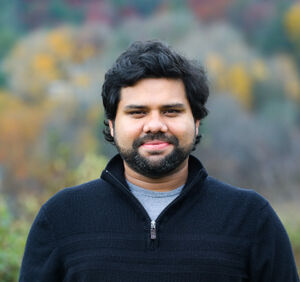
Md Sharif ISLAM
My name is Sharif Islam, and I work as a postdoctoral research associate in the Space Enabled research group at Massachusetts Institute of Technology (MIT). Originally from Bangladesh, I have made significant contributions in academia and as a young space professional. My research focuses on leveraging satellite earth observations to address issues related to different sustainable development goals (SDGs). Currently, my research contributes to addressing issues ranging from drought to coastal erosion in developing countries such as Angola, Bangladesh, and Brazil. I have received several prestigious awards, including the Future Earth Coasts (FEC) Fellowship and the Earth Science Information Partners (ESIP) Community Fellowship, in recognition of my contributions as an early career researcher. My diverse and impactful contributions in academia and as a young space professional underscore my dedication to advancing knowledge in the fields of earth observation and environmental science.
I am passionate about making space technologies more accessible in developing countries to foster diversity and address issues related to global sustainable development goals. International collaboration in the space sector can lead to a better world for all. Through collaborative efforts, countries can combine their resources, knowledge, and technological advancements, resulting in missions that are not only more streamlined but also more economical. This sharing of scientific data, research discoveries, and technological breakthroughs facilitates a richer comprehension of both space and the cosmos. Moreover, international alliances in space exploration strengthen diplomatic ties, encourage peaceful interaction, and cultivate mutual confidence among nations.
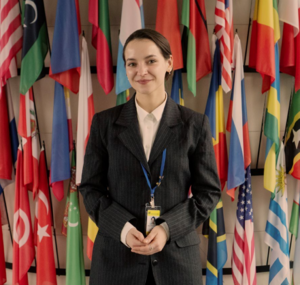
Miraslava KAZLOUSKAYA
Miraslava, an Associate at PwC's Space Practice, provides regulatory and market analysis for international projects across the entire space value chain.
She possesses an extensive academic and professional background. During her bachelor’s studies in International Law at Belarusian State University, she helped develop the Space Law School and received a 1st class award at a National Contest for her space law paper. With prestigious scholarships, she pursued an Advanced LLM in Air and Space Law at Leiden University and an MSc in Space Studies at the International Space University.
Miraslava apprenticed at the National Academy of Sciences of Belarus, promoting peaceful space uses in CIS countries. She also interned at Airbus DS, worked on Copernicus services at Groundstation.SPACE, researched the Space Assets Protocol at UNIDROIT, and contributed to the 66th UNCOPUOS session as a UNOOSA intern.
She co-leads the research team within the SGAC Space Law and Policy Project Group and serves as Belarus’ National Point of Contact. She is also a member of IISL and the IAF/IAA/IISL Advisory Committee. Additionally, she has published several academic papers, won a team award at the Cassini hackathon, participated in moot courts as a pleading agent and co-coach, and is a Belarusian Future Leader Award finalist.
Miraslava believes that international collaboration is vital for developing sustainable methods to explore the cosmos and utilize space technologies to enhance societal well-being. Embracing diverse professionals and private companies alongside governments fosters inclusivity and innovation, leading to shared benefits for all.
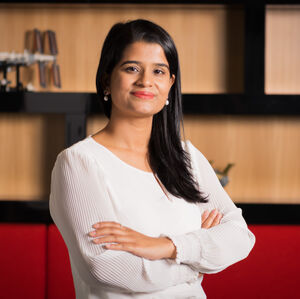
Natasha DISHA
Like many others in the space industry, my dream of being part of the international space industry started relatively young, encouraging me to pursue my degrees in engineering and physics at the Australian National University (ANU). As an Engineers Australia member, I have worked as an academic at ANU, where I taught undergraduate and postgraduate students. I have actively contributed to building Australia’s system engineering workforce, which later went on to work in the Australian space industry. Currently, I am working as a Business Development Manager (BDM) at the ANU Institute for Space (InSpace), where I lead the space education program for ANU. One of my key responsibilities in this role is building relationships with international stakeholders to ensure Australia is doing enough to develop its talent pipeline. In this program, I am researching Australia’s space education industry by cultivating conversations with key players in the Australian space industry, including the Australian Space Agency, Space Industry Association of Australia, and Aviation/Aerospace Australia, to name a few.
Additionally, I am proud to lead two Space medicine projects as BDM for iLAuNCH, an Australian Government’s Trailblazer program, by developing collaboration between industry, government, and universities.
I consider myself an advocate of Australia’s space industry. I have had the privilege of publicly sharing my views on it, including attending interviews conducted by BBC London and SBS World News.
My attendance at IAC 2024 will help me build international relationships and advocate for Australia’s space industry.
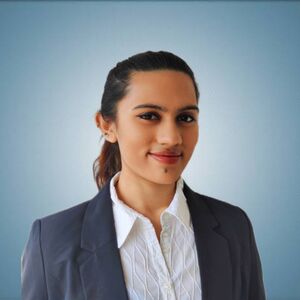
Nishita SANGHVI
Nishita is currently pursuing a dual Master's degree in Aerospace Engineering and Systems Engineering at the Technical University of Munich (TUM) and ISAE-SUPAERO, respectively. Originally from India, her academic journey has taken her to Europe, where she is committed to contributing to the international space community.
Nishita gained practical experience working as a project trainee at the Indian Space Research Organisation (ISRO). Her work focused on the star trackers and sun sensors of the Indian Data Relay Satellite System (IDRSS), a constellation of communication satellites. Her interest extends to CubeSats and SmallSats, which she recognizes as a promising avenue for democratizing space access and fostering innovation.
Nishita believes that sustainable space practices are essential and should be incorporated into every facet of space exploration. To advocate for this, she serves as the PR and Communications Coordinator for the Space Safety and Sustainability Project Group (SSS PG) under SGAC. In this role, she engages with audiences to raise awareness about space safety and sustainability, emphasizing their importance.
Beyond professional pursuits, Nishita is passionate about space education and enjoys sharing her knowledge with children. Through workshops and mentorship sessions, she has impacted over 500 students from diverse backgrounds in her home country. Nishita remains dedicated to expanding her educational outreach efforts, aiming to reach more students in India and developing countries globally.
Nishita is driven by the belief that the true potential of space resources can only be unlocked through responsible and equitable sharing amongst all nations. She envisions a future where space research and technology are not exclusive pursuits, but accessible to everyone. This future, she believes, can only be built on a foundation of inclusivity, diversity, and sustainability.
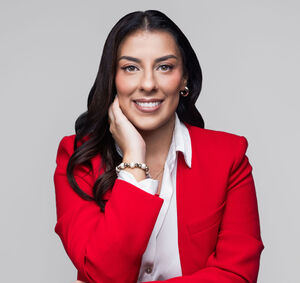
Rebeca JIMENEZ
Rebeca is a Senior Project manager at OpenText. She has worked in software licensing, as a data and project analyst. She has knowledge in bilingual preschool education, data science, Python programming, cloud computing, marketing-communications techniques, and is currently pursuing a degree in entrepreneurship at the International University of Applied Sciences (IU) in Germany.
She is an enthusiast and lover of space, having participated in hackathons (Nasa Space Apps Challenge) and attended conferences (SGAC -IAC) and helped organize the regional space event as a Communications Lead for SGAC. She is currently part of the Commercial Group at SGAC and works on other projects/start-ups in the space sector. Has been invited as a speaker for Space-Organizations, has volunteered through programs that empower girls and women in STEAM careers. She won a scholarship to the first Space Gala of Reinvented Magazine 2022, aimed exclusively at girls in the STEAM field, which is held annually at the Florida-NASA Kennedy Space Center. She has been a pioneer in space camps in Costa Rica (Campamento Galileo) for children of primary ages and hopes to share everything about space through education. She currently is a Co-Founder of the Orion Outreach Foundation for STEAM and Space Education in Costa Rica.
She loves connecting with new people, sharing experiences, and helping others when needed. She firmly believes that space is for everyone and that you should always follow your dreams, be passionate about it, and never give up.
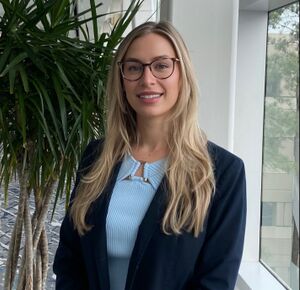
Ruby PATTERSON
Ruby Patterson is a Space Industry Consultant and Doctoral Candidate in Geology at the University of Houston (USA). Formerly a Mars Geochemist at NASA's Johnson Space Center, she contributed to ongoing scientific operations on Mars and future missions to the Moon and Venus through her geochemical research. In 2023, Ruby led a groundbreaking research expedition to Iceland, establishing a new Mars environmental analog site in collaboration with NASA, the Icelandic Space Agency, and the University of Houston. An award-winning speaker, scientist, and thought leader, Ruby is dedicated to advancing the future of sustained human presence on the Moon, particularly through in-situ resource utilization. She advocates for international collaboration as the key to safely and sustainably exploring and leveraging lunar resources. Ruby looks forward to connecting with fellow scientists and policymakers in Milan this October.
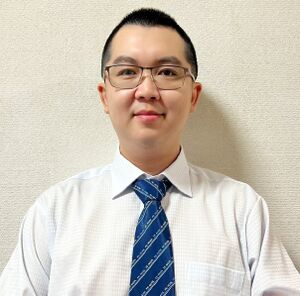
Sackdavong MANGKHASEUM
Sackdavong MANGKHASEUM is a Ph.D. candidate in Electrical and Space Systems Engineering at Kyushu Institute of Technology (Kyutech) in Japan. He received a UN/Japan Long-term fellowship “Post Graduate Studies on Nano Satellites (PNST)” to pursue a master’s degree and doctoral degree in Space Engineering International Course (SEIC) at Kyushu Institute of Technology. During his studies, he had a great opportunity to be involved in the 3U CubeSat project, which is called Curtis satellite at the Laboratory of Lean Satellite Enterprises and In-Orbit Experiments (LaSEINE), Kyushu Institute of Technology (Kyutech), where he is responsible for the communication subsystem and antenna deployment mechanism. His research area is utilizing earth observation data, image processing, and machine learning approaches. Moreover, he served as the National Point of Contact for Space Generation Advisory Council (SGAC) in Laos. Therefore, he tries to promote space technology and education at schools and universities in his country. He truly believes that educating young students through project-based learning, particularly in areas like CanSat and CubeSat, stands as a crucial factor in fostering space awareness and advancing the space sector in Laos. In addition, Sackdavong aims to promote international cooperation in the utilization of satellite data and space technology to solve problems in various areas in developing countries.
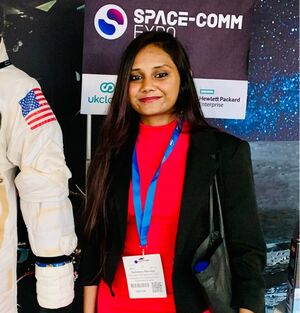
Sam RAVI
Sam Ravi is a final-year Aerospace Engineering student at the University of Leicester, United Kingdom. She completed a 13-month Industry Placement Program with Airbus Defence and Space in the Innovations Department, where she was immersed in groundbreaking and disruptive space technologies and concepts across both defence and space sectors. Winning an internal call for ideas at Airbus related to Space Sustainability led her to discover her passion for Space Situational Awareness (SSA) and Space Surveillance and Tracking (SST). This inspired her final year dissertation, which explores novel technologies for SSA and SST, aiming to design an ideal solution to the exponentially escalating space debris challenge and ensure space safety and peace.
In her final semester, Sam worked part-time for Seraphim Space in the Space Camp Accelerator, where she scouted and analyzed early-stage startups, across the world and worked with pioneers at the forefront of the space industry. She is passionate about networking and ingraining herself within the industry and space ecosystem, and keen on staying on top of the latest news and technologies.
Throughout high school, Sam was involved with the New York Academy of Sciences on several projects with people all around the world, working on solutions to achieve the UN’s 2030 Sustainable Development Goals. She won the Distinguished Student Award twice from NYAS (2017 and 2019), presenting her solutions to 14 Nobel Laureates and later to corporate CEOs. At university, she led several teams in national and international competitions, from designing Mars Rovers and Lunar Colonies to conducting research on Alien Linguistics. In 2023, she was named Engineering Student of the Year in the UK by IET, EqualEngineers, and the Engineering Talent Awards. In addition to her proactive involvement in the space industry, she volunteers with SGAC and SGUK, and participates in various side projects focused fundamentally on innovation and space sustainability.
Her ultimate dream is to lead a space mission and start her own space company, tackling frontier challenges and potentially traveling to space, maybe Mars. Growing up in seven countries has instilled in her the determination and belief that anything is possible by not being scared to dream, and that the sky is most certainly not the limit. She is committed to promoting international space collaboration and diversity in the space sector.
Sam is thrilled to attend her first International Astronautical Congress (IAC) this year, having been chosen for this prestigious award as an Emerging Space Leader 2024, as well as having seven abstracts accepted.
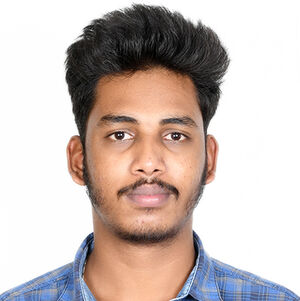
Sanath Kumar NAIK LAKSHMAN
Hello! Everyone, I’m Sanath Kumar Naik L, an Aerospace and Marine Engineer with a Master's degree in Aerospace Technology, specializing in aerospace structures, aerodynamics, and computational fluid dynamics.
Currently, I serve as a Senior Engineer at National Aerospace Laboratories, focusing on Finite Element Method and Computational Fluid Dynamics for aircraft structures and test rig development. My prior experience includes CFD analysis at Gas Turbine Research Establishment, where I honed my skills in advanced simulation techniques.
One of my notable achievements includes presenting research on Agricultural Hybrid Drones at pfam2023 and co-authoring a research paper on "Swarm UAVs for Efficient Remote Sensing on Mars" at the International Astronautical Congress 2023. Beyond my academic and professional pursuits, I am deeply engaged in space technology and have actively participated in seminars conducted by the Indian Space Agency on the future of space exploration. My research endeavors center on optimizing exploration efficiency through decentralized decision-making, dynamic path planning, collision avoidance, and efficient communication among UAVs, specifically tailored for Martian exploration. Apart from my professional endeavors, I am an avid guitarist with a deep passion for Indian classical and rock music. Additionally, I find joy in sports like cricket, cycling, and motorsport (Formula 1).
Let's connect and explore opportunities in the exciting world of aerospace!
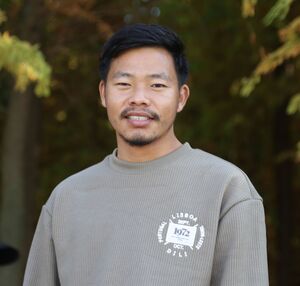
Shahadev RAI
Shahadev Rai is an Undergraduate Student Member of Nepal Astronomical Society and passionate space enthusiast currently studying physics at Amrit Campus, Tribhuvan University. He is actively working to bridge the gap between lack of space education and the captivating world of cosmic exploration. Having witnessed firsthand the disparities in access to space education and resources, he is dedicated to actively contributing to fostering space science and astronomy in marginalized communities of the Eastern Region of Nepal.
As an undergraduate student member of Nepal Astronomical Society, Mr. Rai continuously leads a series of astronomy and space educational & outreach programs. These include workshops such as Build a Rosetta Mission Water Rocket Workshops, Stargazing Sessions, Space-quiz, and Lunar and Solar eclipse observations for the primary and secondary level students. He utilizes locally available resources to reach the marginalized community of Srilanka Tappu island of Sunsari district and Belaka Municipality of Udayapur district.
Mr. Rai has discovered two provisional main belt asteroids and has been mentoring the students in the All Nepal Nepal Asteroid Search Campaign. He facilitated the students from remote regions to participate in the asteroid search campaign. Moreover He has been actively working to cultivate space literacy, raise public awareness and sensitize young school students on the topic of astronomy and space science. Mr. Rai strongly believes in international cooperation for equity and inclusivity in the realm of space science. He advocates for the marginalized students, empowering them to draw closer to the wonder of space.
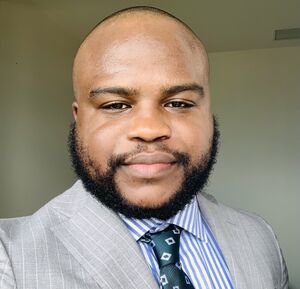
Senior SHIMHANDA
Senior SHIMHANDA is a Japan Society for the Promotion of Science (JSPS) Fellow at the University of Tokyo (UTokyo), Japan.
As a PhD candidate in the UTokyo Department of Advanced Energy Engineering, Senior conducts high-power electric propulsion research in the Komurasaki-Koizumi Space Propulsion Laboratory.
Prior to the JSPS Fellowship, he was a Japanese Government MEXT Scholar. In 2018, Senior was awarded the Japan International Cooperation Agency’s ABE Initiative Scholarship to the Kyushu Institute of Technology,
where he mastered the Space Engineering International Course (SEIC) at the Laboratory of Lean Satellite Enterprises and In-Orbit Experiments (LaSEINE). Besides being an alumnus of the 5th Biennial African School of Fundamental Physics and Application, Senior was part of Namibia’s first cohort in the Newton Fund’s Development in Africa with Radio Astronomy Training.
He is also a student member of the Electric Rocket Propulsion Society (ERPS) and the Japan Society for Aeronautical and Space Sciences (JSASS). His research interests lie at the intersection of plasma propulsion and plasma diagnostics.
He is particularly into Electrodeless Plasma Thrusters (EPTs) for Deep Space Exploration, as well as in-situ electrostatic probes.
The TRL of EPTs is presently low, requiring a united front to optimize their thrust efficiency. Hence, Senior’s career goal and duty to devote himself to EPTs. Finally, he firmly believes that international cooperation and space are mutually indispensable.
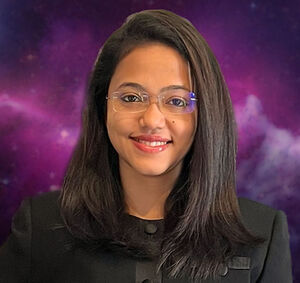
Shreya SANTRA
Dr. Shreya Santra, is an Assistant Professor at Tohoku University, Japan. Her expertise spans in designing intelligent autonomous systems, focusing on multi-robot coordination, perception and motion planning algorithms in unstructured challenging environments. With prior experience in industrial robots for warehouse logistics, small satellite constellations and high-altitude balloons, her current research focuses on AI and Deep Learning techniques applied on multi-modular planetary robots.
She pursued her Ph.D. at Tohoku University's Space Robotics Lab in collaboration with DLR Institute of Communications and Navigation, awarded by MEXT Japan and DAAD Germany. She holds an undergraduate degree in Electrical Engineering from India, a Masters in Space Studies from the International Space University, France, and an M.Sc. in Space Engineering Systems from the Skolkovo Institute of Science and Technology, Russia.
Having lived in six different countries over the past decade, she has gained vast experience working with international teams collaborating with international teams. She is the Scholarships Team Co-coordinator at SGAC and has been recognized for her STEM outreach activities and contribution towards the growth of the organization. She is a co-founding member of Spaceport SARABHAI, India’s first space policy think tank, where she curates debates and dialogues on topics crucial to the current space scenario.
She advocates for sustainable development through awareness, innovation and collaboration. Her goal is to motivate a generation of young explorers by mentoring them to follow their dreams and inspire innovative ways of sustainable exploration of Earth and beyond. She enjoys dancing, gardening, and traveling, prioritizing sustainability in her daily life.
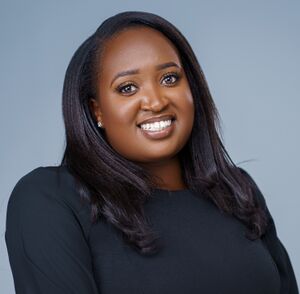
Stella Chelangat MUTAI
Stella Chelangat Mutai is a 31 years old female, Kenyan, She is Geospatial Specialist with over 5 years of demonstrable experience in geospatial data analysis and management, remote sensing, and using geospatial data to provide solutions especially during emergency preparedness and response. She completed her Bachelor in Geospatial Information Science in 2016. From 2017-2019 she continued her Master's in Geoinformation Science and Earth Observation at the University of Twente, Netherlands. Equally has gathered a Certificate in Use of Geospatial Technology for Sustainable Development Goals – Food Security from Central European University in Budapest, Hungary. Additionally she equally pursued bachelor in Geospatial Information science from Dedan Kimathi University of Technology, Nyeri. Stella was awarded top 40 under 40 2023 by BD Africa and as well Top 50 rising stars 2023 in geospatial in the world by world geospatial council. Stella was awarded GEO Individual Excellence Award: Presented for exemplary work in promoting the use of Earth Observation (EO) data and tools to deliver meaningful impact across Africa during the GEO virtual awards ceremony at the GEO -17 Plenary | November 2021 https://lnkd.in/gZAGJgWr. Stella emerged as one among the Top 15 Women Leading the Machine Learning for Earth Observation Community (ML4EO) (2020–2021) (https://lnkd.in/d7ruz7b). Stella emerged winner in Farming by Satellite Winner of Special Africa Prize—“Digital Earth Africa and Earth Observation in Monitoring Coffee Farming in Kenya” (2020) (http://www.farmingbysatellite.eu/past-winners/2020/). She has gathered work experience with GIS and Earth observation analytics consultant working with multilateral organizations such as the United Nations’ International Fund for Agricultural Development. Stella currently works for United nations at World food Programme as a Geospatial consultant.
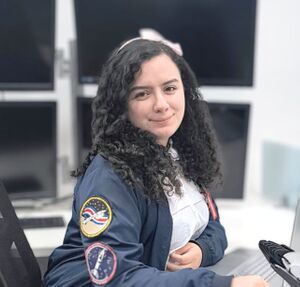
Stephanie Maria LEITON RAMIREZ
I’m a space dreamer from Costa Rica. A computer master's student and member of the Aerospace Engineering Group (GIA) of the University of Costa Rica. Also, a young professional, in the computational area at the PRIAS Laboratory of the CeNAT. In the GIA group, we carry out scientific and technological outreach activities to inspire students and professors from different disciplines to participate in aerospace and aeronautical research, and we strive to promote women in STEM. These invaluable experiences have motivated me to take a role in education as a university professor, promoting students to explore the world of computers through examples related to space.
In PRIAS Laboratory, I work on developing systems for sharing spatial data applications that assist decision-makers, as well as project management to promote geo-aerospace science and technology through web platforms. An example of this is creating a "Creative Space" where we can learn, explore, and share space science and technology.
As a creator of techno-scientific content, I share my experiences as a woman in STEM, an engineer, and a space enthusiast. My goal is to pursue space dreams, support enthusiastic interest in technology and space, and motivate future researchers. I am thrilled to share this experience at the IAC and continue contributing to the world of space!✨
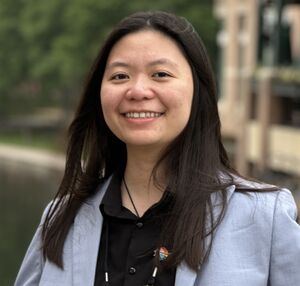
Minh LE
Minh Lê received a BS degree in Astronomy and Astrophysics from Florida Tech and is now pursuing a Ph.D. in Mechanical Engineering at Johns Hopkins University, specializing in the mechanics of hypervelocity impact on rubble pile asteroids.
At Florida Tech she studied a B-type binary star system and had the opportunity to present posters on her work at the Florida Academy of Sciences in 2019 and 2021. As the president of the Students for the Exploration and Development of Space chapter at Florida Tech, she organized technical workshops and aided members in attending SpaceVision 2019. Minh was part of the L’SPACE NASA Proposal Writing and Evaluation Experience Academy where she co-wrote a proposal for ISRU on the Moon that was among the award-winning proposals in the academy. After graduation, Minh participated in the Young Scientist Program of the Blue Marble Space Institute of Science where she studied the possibilities of extinct or extant life throughout Martian history. These opportunities ignited her desire to follow the applied research path and aid with future space missions. Minh has given presentations on her Ph.D. work on hypervelocity impact experiments at the Lunar and Planetary Science Conference and Mach Conference.
Minh believes that space studies and exploration should be a collaborative effort not only between nations, but also between commercial companies and government agencies to share knowledge, enable technology development, and allow humanity to advance faster in this space-faring journey.
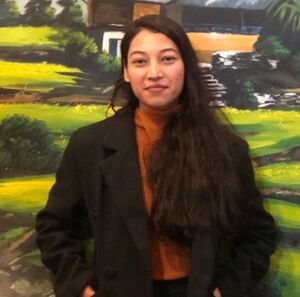
Trishna SHRESTHA
I graduated with a Bachelor’s degree in Electrical and Electronics Engineering from Kathmandu University, Nepal. Currently, I work as a satellite research fellow at Antarikchya Pratisthan Nepal. I have been involved in multiple CubeSat projects, primarily focusing on hardware system designs. I had the opportunity to lead the Electrical Power System of Munal, Nepal’s first 1U High School CubeSat, and mentored high school students in its development. Additionally, I am one of the system engineer of the APN LoRa Payload, a project selected for the first payload hosting initiative by UNOOSA and MBRSC. Currently, my work is related to improvising the CubeSat bus system.
As part of APN’s outreach program, I’ve helped design the Educational Satellite (E-cube), which aims to educate school students from grade 7 and above, reaching over 1000 students from different schools across Nepal. Currently, our focus is on capacity-building initiatives, and collaboration for space resources development in Nepal. And International cooperation plays a crucial role in facilitating these efforts.
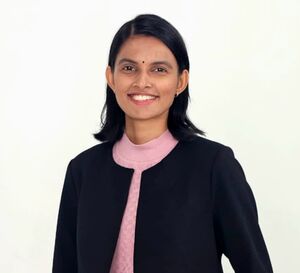
Vanmitha ATHIMOOLAM
Vanmitha Athimoolam, a process engineer from UMW Aerospace Sdn Bhd visionary entrepreneur at the forefront of the space industry. Graduating with honors from Universiti Sains Malaysia (USM) with a degree in Aerospace Engineering, Vanmitha's fascination with space exploration began at a young age, fuelled by countless hours spent watching rocket launches and studying the cosmos.
Her passion for aerospace, led her to participate in various competition projects, including the development of sounding rockets and satellites. Under her leadership, Malaysia made its inaugural participation in the world’s largest student rocket launch competition, Spaceport America Cup 2022 where they designed, built, and launched Malaysia's first ever student made sounding rocket. In the year 2023, she achieved another vision of hers making the rocket 100% made in Malaysia that was launched in Spaceport America Cup 2023. Driven by her passion in rocketry, she founded Wau Rocketry in USM, that aims to a become a platform for the students to get exposure and experience of rocket science. Vanmitha’s never give up mindset has also set her on a journey of reaching for stars where she emerged as the first Malaysian to get selected as a Career Astronaut Candidate by AdvancingX.
Driven by a desire to turn dreams into reality, Vanmitha launched her own startup, Wau Holdings. Through her leadership and dedication, Vanmitha is shaping Wau Holdings into a beacon of innovation and environmental stewardship in the space industry, inspiring others to join the mission to make space travel greener and more sustainable.
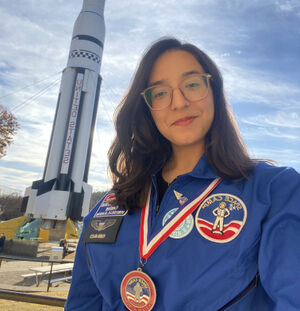
Yumna MAJEED
Yumna Majeed is a dedicated Space Educator and the founder of Exploration, a STEAM Education organization with a focus on outer space, actively promoting astronomy and space technology in Pakistan since 2016. She firmly believes that every child should have their space-related questions addressed, a need often overlooked in traditional classrooms. To address this gap, she collaborates with various international space organisations, bringing the wonders of the cosmos directly into classrooms. Her organisation, Exploration, provides a diverse array of space-centered learning experiences designed to ignite curiosity and showcase the wide range of subjects and opportunities in STEM fields. Through her programs, Yumna has engaged over 15,000 students all over Pakistan.
At the Space Generation Advisory Council, Yumna has served as an NPOC for Pakistan and currently serves as Asia Pacific Regional Partnerships Manager. Yumna has received Asia Pacific Space Leadership Award 2019 and Global Rising Star Award 2022. Her commendable efforts have earned her the Pride of Pakistan Award, the prestigious Diana Award, and international recognition as a champion for Gender Equality in Space by the United Nations Office of Outer Space Affairs.
Yumna Majeed, a Medical Lab Technologist, graduated from Allama Iqbal Medical College, Lahore.
